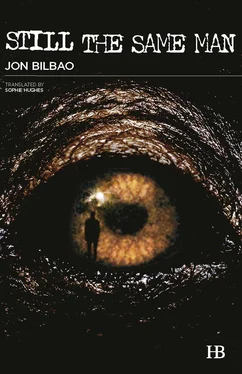He was in a small clearing, leaning against a tree. His right hand was resting on the handle of the machete, which he was carrying in his belt. The chimpanzee was crouching on the ground at his side.
In the middle of the clearing, spurred by the threat that if he tried anything, the monkey would die, Abraham had just finished digging a grave. The earth oozed moisture — a black, fragrant mulch that kept slipping back into the hole. Abraham was covered in dirt, as if he’d been rolling around in the mud. On his face, only his eyes and teeth were visible. He worked on his knees, his sole tool being a dented aluminum plate that he’d selected from among his odds and ends and was using as a shovel.
They’d had to wait for sunrise before setting to work. By then, they’d already wrenched the boards from the windows. Earlier that morning, before doing anything else, they’d removed the dead bodies from sight, hiding them for the time being in the undergrowth.
The next step now was to move the car off the cabin track and stow it in some hidden corner on the road. Joanes had already guessed someone from the hotel would turn up in the morning. He put the woman’s wheelchair in the trunk. He also stored the elderly couple’s luggage and the things the owner of the English Residence had given them. He’d get rid of all that later on. Finally, he grabbed his own meager luggage.
He told Abraham to wait for him in the cabin. He didn’t bother to tie him up, since the easiest way to stop him from running off was to keep ahold of the chimpanzee. And yet, driving and watching over the monkey at the same time would have been too tricky, and in any case the chimpanzee would have been too conspicuous if they’d come across anyone on the road. Once the cabin was out of sight, he tied the monkey’s chain to a tree and left him there.
When he came back a while later, he had a little scare. The chimpanzee wasn’t moving. It was resting against the tree trunk with its head slumped to one side. Joanes thought it was dead. If that was the case, he would have no way of controlling Abraham. He nudged the chimpanzee with one end of the cane.
“Come on, Gagarin. Don’t fail me now.”
He nudged him again.
The chimpanzee slowly stirred. The hood covering his head moved from one side to another. Joanes let out a big sigh of relief.
When he was just a couple of paces from the cabin, Joanes stopped and called to Abraham. He ordered him to come out with his hands above his head.
“You’re not going to give me any surprises, are you, Abraham?”
Abraham shook his head.
“That’s what I like to hear. Now walk here in front of me. Not too fast. Not too slow.”
Together they went in search of an appropriate place to bury the professor and his wife. The monkey followed them, attached to Joanes by the chain and cane, tripping over the roots of the trees.
Abraham stopped several times as he dug the grave, encumbered by great sobbing attacks. Once or twice he vomited a few gloopy threads of bile. He told Joanes that he couldn’t get the faces of the professor and his wife the moment they died out of his head, that he’d never forget them, and Joanes responded by saying that that was exactly what he had to do. He, Abraham, from then on, was a container for the memory of the last moments of those elderly people’s lives. Abraham was silent for a few seconds and then began to mumble about something the professor had done before dying. Joanes pointed the machete at him and ordered him to be quiet.
“It’s enough for you to know and remember what happened,” he added.
When the time came to lower the bodies down, Abraham got out of the hole and took a few steps back. Pushing them with one foot, Joanes rolled the professor and his wife into the grave. He enjoyed the slight resistance their bodies gave. He’d stripped them of their wallets, watches, and wedding rings beforehand. She wasn’t wearing any other jewelry. He told Abraham to cover them up.
The pain in his hand observed a cruel, arcane logic. It came and went in waves. At its most intense, Joanes felt like he needed to run, to do anything that might distract him from the pain. Instead, he vented some of it by ordering Abraham to work faster. Abraham looked at him, his eyes red from exhaustion, tears, and the earth that had gotten in them, but barely changing his pace.
Despite the pain and tiredness, Joanes felt tremendously lucid. The night before, he’d had time to plan what he had to do. As soon as they got rid of the bodies, he’d look for a doctor to fix him up and give him a rabies shot. He’d explain the injuries by saying that a vagrant dog had attacked him. He’d gotten lost looking for the evacuation hotel and hadn’t had any choice but to spend the night in his car. When he’d set off the following morning, he’d gone over a broken branch and gotten a flat tire. While he was changing it, the dog had attacked him, or rather several dogs, a pack. That’s what he’d tell whoever asked him. A simple, perfectly believable story, something that could easily happen to a careless tourist who didn’t know the area and didn’t have any experience with hurricanes. Then he’d go to Valladolid, back to his family.
On the off chance that anyone should ask him about the professor and his wife, he’d admit that he’d picked them up on the highway, and also that they’d stopped briefly at the English Residence, where they’d been asked to leave. On seeing the uninhabitable state of the cabin, they’d all decided to move on, until, totally lost, they’d had to stop. He would confirm that the last time he’d seen them was that same morning, when he left them safe and sound at the bus station in a nearby town.
But he was pretty sure that nobody was going to probe his story further. He supposed there’d be other lost tourists, accidents, and that the hurricane would have left several victims in its wake, far more important things than someone having been attacked by a bunch of dogs. And he supposed that nobody ever set foot in that clearing. And he also supposed that the avid tropical soil would soon dissolve the bodies. All of these, to him, were completely plausible suppositions.
“It’s done,” said Abraham.
“Get up. Go over there by that tree and don’t move.”
Joanes looked over the place.
“You’ve done a nice job, Abraham.”
“Can we go now?”
“That’s what I promised you. But this,” said Joanes, gesturing at the machete, “and this,” pointing to the cane on the ground, “are staying with me. You can take your monkey.”
Abraham got down on his knees next to Gagarin and with trembling hands unleashed him from the tree to which he’d been chained. He took off the makeshift handcuffs behind his back and, finally, removed the hood. The monkey blinked and looked from one side to the other. He let out a long moan. There were dry, bloody scabs on his head and on one of his ears, which had been bleeding from the inside.
“Gagarin, Gagarin. .” repeated his master, who burst into tears again. “My friend.”
The chimpanzee leaned in toward him, and the two embraced. They stayed there like that for a long time, under the attentive eye of Joanes, who eventually said, “I’ll give you some cash. You can hold on to the flashlight, too; I’m sure it’ll come in handy. Although you’ll have to come to the car with me to find it.”
Abraham didn’t answer. He was stroking Gagarin’s back.
“If I can do anything else to help you. .”
At last, Abraham got to his feet. The only response he gave Joanes was a look of absolute and intense contempt. Then, swinging his backpack over his shoulder, he picked Gagarin up in his arms. The chimpanzee rested his head on his master’s shoulder and closed his eyes.
Читать дальше












